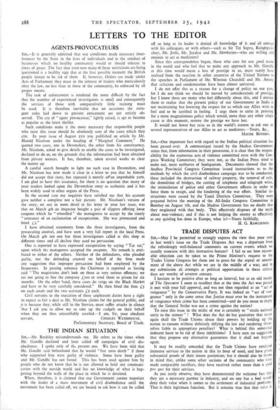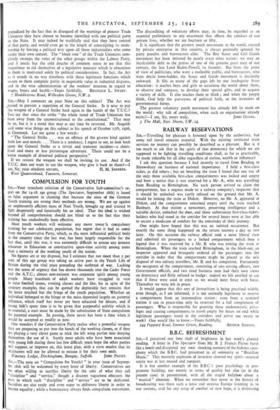TRADE DISPUTES ACT
Sta,—May I be permitted to strongly express the view that your note in last week's issue on the Trade Disputes Act was a departure from the refreshingly well-balanced comments on current events which we usually associate with this instructive feature? I fail to see how reason- able objection can be taken to the Prime Minister's request to the Trades Union Congress for them not to press for the repeal or amend- ment of the above Act while we are in the middle of a war; and in my submission all attempts at political opportunism in these critical days are worthy of severest censure.
I hesitate to be positive after so long an interval, but as an old reader of The Spectator I seem to recollect that at the time the Act was passed it met with your full approval, and was not then regarded as an " act of vengeance" by the Conservative Party. It was indeed an " act of ven- geance " only in the same sense that Justice must ever be the instrument of vengeance when crime has been committed—and do you mean to imPlY that the General Strike was not a crime against the nation?
To raise this issue in the midst of war is certainly to " strain national unity to the utmost " ! What does the Act do but guarantee that never again shall the Trade Unions abuse their powers by holding up the nation to ransom without definitely defying the law and rendering them- selves liable to appropriate penalties? What is behind this somewhat indecent haste to be rid of these inhibitions? I have seen no suggestion that they propose any alternative guarantees that it shall not happen again. It may be readily conceded that the Trade Unions have rendered immense services to the nation in this its hour of need, and have given substantial proofs of their innate patriotism; but it should also be borne in mind that, unlike some other sections of the community who have made comparable sacrifices, they have received rather more than a quid pro quo for their services.
As you justly observe, they have demonstrated the welcome fact that they are a necessary parmcr in industry, and no one but a fool would deny their value when it comes to the settlement of industrial problems. That is their legitimate function. But it remains true that that value 15
prejudiced by the fact that in disregard of the warnings of pioneer Trade Unionists they have chosen to become identified with one political party in the State. It may indeed be truthfully said that they have control of that party, and would even go to the length of conscripting its mem- bership by forcing a political levy upon all those industrialists who come under their own control. The " block vote " of the Trade Unionists com- pletely swamps the votes of the other groups within the Labour Party, and it needs but the cold douche of common sense to see that this impatience to rid themselves of a legislative measure which is obnoxious to them is motivated solely by political considerations. In fact, the Act as it stands in no way interferes with those legitimate functions which secure to them complete parity in negotiable value in industrial disputes, and in the wise administration of the workers' interests in regard to
wages, hours and health.—Yours faithfully, REGINALD L. SWABY. 7 Huddlestane Road, Willesden Green, N.W. 2.



























 Previous page
Previous page